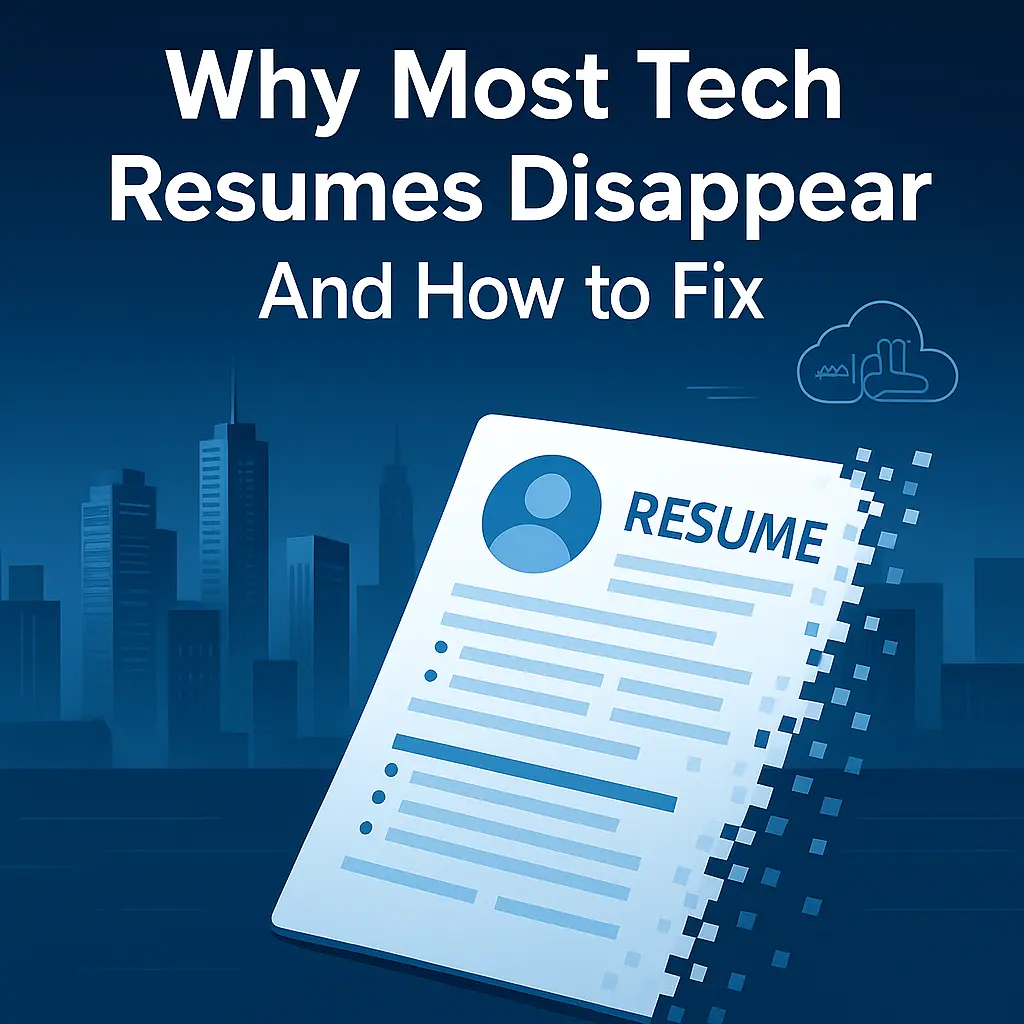You fixed your resume, tailored it well, and now you’re finally getting interview invites.
Congratulations! That’s huge progress.
You’ve already overcome one of the biggest hurdles in the job search process.
But if the interviews are coming without offers, it can feel frustrating, discouraging, and confusing. You may be wondering:
Why am I not getting job offers despite nailing my resume and interviews?
Circling back to square one, from frustrations on not landing interviews to frustrations on not getting offers.
The good news?
You’re off to a great start, getting your foot in the door. Good job on fixing that resume.
But let’s take a step back.
If those interviews aren’t turning into offers, you might be missing a crucial step. A resume is your marketing tool and it’s meant to get you through the door. But once you’re face-to-face with the hiring manager, your job is to validate the strengths your resume claims.
This common problem often signals that while your resume got you in, it may not be fully speaking for itself.
In other words, it may be leaving gaps or raising unspoken questions in the minds of hiring managers. At the same time, your interview strategy may focus too much on impressing, rather than validating and confirming the strengths your resume laid out
Simply trying to impress recruiters during interviews won’t close the deal.
To succeed, you need a resume that almost sells itself and an interview strategy designed to confirm why you’re the perfect fit.
📌If you're still not securing interviews, consider using this free resume builder to enhance your application.
Why a Great Resume Alone Won’t Win You Job Offers
Fixing your resume is only the first step.
Many candidates think that once they secure interviews, their work is done.
The reality is that a resume is meant to get you in, not to land the job. Think of your resume as your gate pass.
It’s true that, initially, you have to pass the ATS filters, and that’s where your resume works its magic.
But it is how you carry yourself in the interview that ultimately gets you the job offer.
Here’s why:
- Your resume should clearly and confidently communicate your value upfront, so interviewers already have a positive impression before you even walk in.
- If your resume only lists tasks or sounds generic, interviewers might struggle to see your unique strengths, making it harder to sell yourself during the interview.
- Even a well-written resume doesn’t guarantee you know how to handle interview questions effectively or strategically align your responses with the employer’s priorities.
So, without a clear interview strategy, you risk showing up unprepared to validate your strengths, answer key questions, or negotiate job offers. This mistake stalls your job search progress.
📌Understand why a generic resume and mass job applications are often flagged by recruiters and how to stand out.
How to Create a Resume That Speaks For Itself
Your resume should do more than list responsibilities or achievements; it must tell a compelling story that makes hiring managers say,
“We need to hire this person.”
Stop listing your responsibilities, this isn’t a to-do list. Skip the dry, lengthy, and boring duties. Instead, explain how you manage your role and highlight the results you deliver.
Keep it simple and easy to digest with bullet points.
Try sounding like a human, not a robot. Make a strong first impression by showing that you're firm, reliable, and confident. Let your resume do the talking, and make sure you show up reflecting those words.
Follow these simple steps:
- Lead with your strongest achievements near the top of the resume to immediately capture attention.
- Use clear, active language that highlights outcomes and impact, not just duties.
- Tailor your resume for every job application using keywords and company-specific language.
- Showcase your unique value, what sets you apart from other candidates?
- Keep formatting clean and easy to scan so your key strengths jump off the page.
You put in a lot of effort into writing, so make sure you clearly present your value. When your resume does this well, interviewers enter the conversation already impressed and looking to confirm your fit, not discover it from scratch.
📌Thinking of using resume templates? Discover why you should stop using resume templates and how they’re undermining your unique value.
What Does a Foolproof Resume Look Like?
1. The Resume Speaks Before You Say a Word
Your resume must clearly articulate who you are, what you bring, and why you are the solution. Use precise, active language backed by measurable results. Avoid vague phrases like “responsible for” or “helped with”. Your resume should sell outcomes, not just duties.
2. Highlight Your Most Impactful Achievements Front and Center
Don’t hide your best wins deep in bullet points or near the end. Place key accomplishments and skills prominently so recruiters and hiring managers instantly grasp your value. Highlight it on top for easy scanning.
3. Tailor Every Resume to the Role With No Exceptions
A generic resume is a silent deal breaker. Customize keywords, phrases, and achievements to echo the job description and company values, showing clear alignment. This is how your resume becomes a direct answer to “Why should we hire you?”
We’re done with the first part, now we’re off to the second half.
📌Learn how to craft a resume that consistently leads to real job offers.
Why Interview Strategy Is Just as Important as Your Resume
Even with a resume that speaks for itself, you can’t rely solely on your storytelling skills during the interview. Many candidates stumble because they think impressing hiring managers is the only difficult part.
Job search is a series of steps, like a game where you level up. And just like in games, once you complete one goal, you move on to the next. The same logic applies.
After passing the initial stage, interviews are about validating the story your resume told.
In some cases, you go through multiple rounds of interviews. It can feel like passing through the finest sieve over and over.
But this is where you need to step up your game.
This stage is not just about getting your foot in the door. It’s closing the door behind you so no one else gets in.
The interview stage is where the competition gets fiercer.
Think beyond just a normal interview. Yours should be memorable. One that will signal the hiring manager to stop the hunt and say,
“We found the right one.” And eventually,
“Congratulations, you passed the interview. Please expect an official job offer from us.”
To hear that, you need to:
- Validate and reinforce the strengths and accomplishments you highlighted in your resume.
- Practice STAR (Situation, Task, Action, Result) storytelling to clearly illustrate your achievements and problem-solving skills.
- Demonstrate confidence by backing up claims with data and specific examples from your experience.
- Anticipate common interview questions and prepare stories that demonstrate problem-solving, leadership, and results.
- Research the company’s challenges and goals to tailor your answers accordingly.
- Ask insightful questions that show you understand the company’s needs and culture.
- Negotiate confidently to ensure your compensation and role reflect your value.
- Follow up thoughtfully after interviews to reiterate your enthusiasm and fit for the role.
Even with a strong resume, you still need to connect the dots and engage meaningfully with the interviewer.
Insider Tips From Recruiters and Hiring Managers
We talked to career experts from different industries, and we kept hearing the same things over and over. So we pulled it all together.
But here’s the thing. It helps to flip the script.
Try looking at your whole application, from your resume to your interview, through the recruiter’s eyes. That’s when you start spotting the gaps. Maybe something in your resume doesn’t quite add up.
Maybe your answers sound good but don’t really hit home.
Once you notice those gaps, you can actually use them to your advantage. Clean up your pitch. Tweak your approach.
The best candidates don’t just talk. They watch. Pay attention to the recruiter’s body language. A raised eyebrow. A slight pause. A shift in their seat. These small things can tell you way more than their words do.
If you can pick up on those cues and adjust on the spot, you’re not just answering questions anymore. You’re owning the conversation.
You’re the one who makes them think, “We need this person.”
Beyond Impressing: Your Guide to A Successful Interview
Previously, we talked with career experts and here’s what they say works when you’re in the interview hot seat:
Dress to Impress
Even with virtual interviews, dress appropriately. What you wear speaks before you do. Choose an outfit that matches the company culture and shows you take the opportunity seriously.
Validate Your Value
Your goal in the interview is to validate the strengths and impact your resume highlights, providing concrete examples and confident answers. This builds trust and makes the hiring decision easier.
Prepare to Address Resume Gaps or Claims
If your resume mentions big achievements or leadership, be ready to explain the “how” behind them with specific anecdotes.
Ask Insightful Questions
Demonstrate that you understand the company’s challenges and culture by asking questions that connect your skills to their needs.
“Silent Red Flags” Recruiters Spot
Recruiters often notice inconsistencies between your resume and interview answers more than the average candidate realizes. Even small hesitations can raise doubts.
Power of Micro-Storytelling
Instead of generic bullet points, use brief, vivid mini-narratives that showcase how you solved specific problems, with real numbers and results. This makes your achievements memorable and believable.
“Right Fit” Is More Than Skills
Hiring managers look for cultural fit and growth potential. Use your resume and interview to show adaptability, learning mindset, and collaboration, not just technical skills.
📌Unsure which skills to highlight? This AI tool can assist in identifying the most relevant ones for your resume.
Don’t Over-Prepare, Over-Adapt
Candidates who sound like they’re reciting a script often fail to connect. Be authentic in your interview validation, remember your resume gave the facts, your personality should seal the deal.
This is often observed in new graduates who are struggling to break into the job market and navigating interviews.
Using a Resume Builder That Speaks for Itself
Finding the right words and structure for your resume can be tough, especially when every job application needs a slightly different approach.
Jobsolv helps you tailor each resume specifically for the job you want. It’s not just about filling in the blanks, but it makes sure your resume clearly shows your unique value and accomplishments.
When your resume speaks confidently on its own, it makes your job easier at the interview stage.
Using a tool like this means you spend less time guessing what recruiters want and more time focusing on preparing to back up your story during interviews. It’s like having a solid foundation under your feet so you can walk into any interview room knowing your resume is already doing part of the work for you.
📌Discover how combining AI tools with a human touch can enhance your job application process.
Frequently Asked Questions: From Interviews to Job Offers
Q: I’m getting interviews but no offers. What am I doing wrong?
You might be lacking an interview strategy. Your resume got you noticed, but your interview answers may not be confirming your strengths or addressing the employer’s key concerns.
Q: How can I make my resume “speak for itself”?
Focus on outcomes, use strong action verbs, tailor your resume for each job, and highlight your top achievements near the top of your resume.
Q: Should I prepare differently for interviews after fixing my resume?
Yes. Your interview preparation should validate what your resume promises and demonstrate why you’re the solution they need.
Q: How do I build confidence in interviews without sounding arrogant?
Share specific results and facts to back your strengths. Confidence comes from clarity and authenticity, not exaggeration.
Q: Can AI tools help me improve both my resume and interview prep?
Absolutely. AI can help you tailor your resume and generate potential interview questions, but your personal insight and story are essential to stand out.
Q: How important is follow-up after an interview?
Very important. A thoughtful follow-up email reinforces your interest and professionalism and keeps you top of mind.
Q: How can I improve my resume to get offers?
Use active language, quantify achievements, tailor for each role, highlight key wins, and create a compelling summary. You can easily do that using a resume builder instead of creating your resume from scratch and often times it’s difficult to speak the hiring manager’s language.
📌Ensure you're not underselling yourself; learn how to effectively showcase your strengths on your resume.
Final Thoughts
Getting interviews means your resume is already doing half the work for you which is awesome. But to land the job you need to be just as prepared in the interview to back up everything your resume promises.
Getting interviews doesn’t mean you’ve already landed the job, but you’re getting there, so don’t stop midway.
If you’re getting job interviews and no real job offers?
Keep refining your resume and interview skills, listen to what recruiters are really looking for, and stay confident. With the right balance you’ll move from almost there to officially hired before you know it.
📌Need help creating your foolproof resume? This free resume builder helps you seal the deal.
.svg)







.webp)










